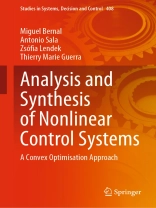This book presents a modern perspective on the modelling, analysis, and synthesis ideas behind convex-optimisation-based control of nonlinear systems: it embeds them in models with convex structures.
Analysis and Synthesis of Nonlinear Control Systems begins with an introduction to the topic and a discussion of the problems to be solved. It then explores modelling via convex structures, including quasi-linear parameter-varying, Takagi–Sugeno models, and linear fractional transformation structures. The authors cover stability analysis, addressing Lyapunov functions and the stability of polynomial models, as well as the performance and robustness of the models. With detailed examples, simulations, and programming code, this book will be useful to instructors, researchers, and graduate students interested in nonlinear control systems.
Innehållsförteckning
Introduction.- Problems to be Solved and Scope of the Book.- Modeling via Convex Structures.- Stability Analysis.- State Feedback.- Performance, Robustness, Observation, and Output Feedback.- Conclusions and Perspectives.
Om författaren
Professor Miguel Bernal received his Ph D in Automatic Control from the Czech Technical University at Prague in 2005. He was a post-doctoral researcher at the University of Valenciennes and Hainaut-Cambrésis, France, from 2006 to 2009. He has been a member of the National Research System of Mexico since 2007. In 2011, he was appointed Full Professor at the Sonora Institute of Technology, Mexico. He has led and supervised several research projects and Ph D theses in Mexico and elsewhere on nonlinear control via convex structures and linear matrix inequalities, an area where he counts more than 40 journal papers and over 1300 citations. Since 2015, he has served as Associate Editor for the journal Fuzzy Sets and Systems. Professor Antonio Sala received his MSc in electrical engineering in 1993, and his Ph D in control engineering in 1998, both from Valencia Technical University. He has been Chair Professor at the Systems and Control Engineering Department, UPV since 2009. For almost 30 years, he has taught a wide range of subjects in the area, including linear systems theory, multivariable process control, and intelligent control. He has supervised eleven Ph D theses. He has taken part in research and mobility projects funded by local industries, government, and the European Community/European Union. He has co-authored more than 80 journal and more than 140 conference papers, and served as Associate Editor of several scientific journals.
Professor Zsófia Lendek received her MSc in control engineering from the Technical University of Cluj-Napoca in 2003, and her Ph D from the Delft University of Technology in 2009. She is an associate professor at the Technical University of Cluj-Napoca. Her current research interests include observer and controller design for nonlinear systems, and in particular Takagi–Sugeno fuzzy systems. Currently, she serves as Associate Editor for the journal Engineering Applications of Artificial Intelligence.
Professor Thierry Marie Guerra received his Ph D in automatic control in 1991 and the HDR in 1999, both from the University of Valenciennes et du Hainaut-Cambrésis. He is now a full professor at the same institution, where he is head of the Laboratory of Industrial and Human Automation, Mechanics and Computer Science. He is Chair of Technical Committee 3.2 – Computational Intelligence in Control – for IFAC, a member of the IFAC TC 7.1 – Automotive Control, Area Editor of the international journals: Fuzzy Sets and Systems and IEEE Transactions on Vehicular Technology. His major research fields and topics of interest are, wine, hard rock, chess, nonlinear control, LPV, quasi-LPV (Takagi–Sugeno) models control and observation, LMI constraints, non-quadratic Lyapunov functions and applications to powertrain systems (internal combustion engine, electrical motors, hybrid vehicles, fuel cells) and disabled persons.












